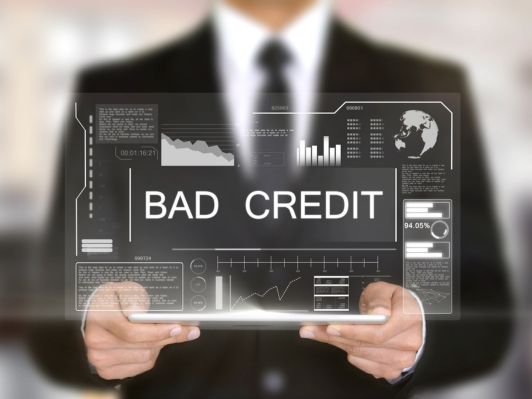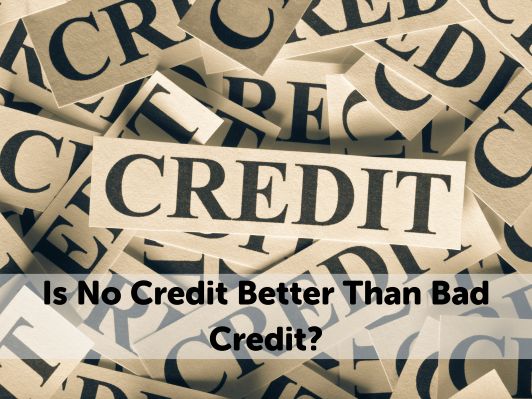In the ever-evolving landscape of personal finance, the question of whether “no credit” is better than “bad credit” is one that consistently perplexes individuals striving for financial stability.
Your credit score, often regarded as the financial report card of your life, can significantly impact your ability to secure loans, rent an apartment, buy a car, or even land your dream job. But what happens when you find yourself at one end of the credit spectrum with no credit history to your name, or at the other end, burdened with a less-than-ideal credit score?
We’ll explore the advantages and disadvantages of both no credit and bad credit and offer actionable tips to improve your creditworthiness.
Table of Contents
What does no credit mean?
Having no credit means you have no outstanding loans or an active credit card. It means that the three major credit bureaus, Equifax, TransUnion, and Experian, will have little to no information about the person’s borrowing and repayment habits.
This can happen for various reasons, such as just starting out in the world of finance after turning 18, having recently moved in-country, or simply not having engaged in credit-related activities.
The pros and cons of no credit
The pros
1. Blank slate: Starting with no credit means you have a clean slate without any past credit mishaps or negative marks.
2. No debt burden: No credit history often means no outstanding debts. It provides a sense of financial freedom and less stress.
3. Flexible financial decisions: Without credit obligations, you have more flexibility in your financial decisions. You won’t be tied down by high-interest rates, monthly payments, or the constraints of credit-related obligations.
4. Privacy: Limited or no credit might mean fewer corporate, or government bodies can access your financial information.
The cons
1. Smaller credit limit: Lenders rely on credit history to assess your creditworthiness. Having no credit history can result in limited access to loans, credit cards, and other financial products.
2. Higher interest rates: When you lack a credit history, lenders might view you as a higher risk, leading to higher interest rates if you do get approved for credit.
3. Difficulty renting: Landlords often check credit reports when considering tenants, so no credit history might make it harder to secure a rental property.
4. No credit score for big purchases: No credit history can make it difficult to obtain a mortgage or car loan, potentially delaying major life milestones.
5. Employment challenges: Some employers in the UK may perform credit checks as part of the hiring process, potentially impacting job opportunities.
6. Less favourable terms: Even if you manage to get credit the terms might not be as favourable as those offered to individuals with an established credit score.
What is bad credit?

Bad credit refers to a person’s credit history that shows a high level of risk to lenders. It indicates that the individual has a history of not repaying their debts on time or not repaying them at all. This can be due to missed or late payments, defaults, bankruptcies, or other negative financial events.
Bad credit can make it difficult for individuals to obtain loans, credit cards, or other forms of credit, and it may result in higher interest rates or stricter terms when credit is available.
What is the impact of bad credit?
1. Difficulty in obtaining loans: With bad credit, it becomes challenging to get approved for loans from traditional lenders such as banks. Lenders consider bad credit as a high-risk factor, making them hesitant to lend money. This can limit individuals’ access to credit when they need it for emergencies, major purchases, or other financial needs.
2. Higher interest rates: Even if individuals with bad credit manage to secure a loan, they are likely to face higher interest rates. Lenders compensate for the increased risk by charging higher interest rates, which can significantly increase the cost of borrowing over time.
3. Limited credit options: Bad credit can restrict individuals’ options for credit cards, mortgages, and other financial products. They may have to settle for subprime lenders or alternative financial institutions that offer less favourable terms and conditions.
4. Difficulty in renting or leasing: Landlords and property management companies often check credit history when considering rental applications. Bad credit can make it challenging to secure a rental property, as landlords may view it as an indicator of financial irresponsibility.
5. Higher insurance premiums: Insurance companies may use credit scores to determine premiums for auto, home, or other types of insurance. Bad credit can result in higher insurance premiums, as insurers perceive individuals with poor credit as higher risk.
6. Employment prospects: Some employers conduct credit checks as part of the hiring process, especially for positions that involve financial responsibilities. Bad credit can negatively impact job prospects, as employers may view it as a lack of financial responsibility or trustworthiness.
7. Emotional and psychological stress: Dealing with bad credit can cause significant stress and anxiety. It can lead to feelings of shame, embarrassment, and a sense of being trapped in a cycle of financial difficulties. This stress can affect overall well-being and quality of life.
So, is no credit better than bad credit?
In general, having no credit is not necessarily better than having bad credit. While both situations can present challenges when it comes to obtaining credit, they have different implications.
No credit means that an individual has not established a credit history or has a very limited credit history. This can occur when someone is young and has not yet had the opportunity to build credit, or when someone has chosen not to use credit in the past. Without a credit history, lenders have no information to assess the individual’s creditworthiness, making it difficult for them to determine the level of risk involved in lending to that person.
On the other hand, bad credit indicates a history of negative credit behaviour, such as late payments, defaults, or bankruptcies. While bad credit may make it more challenging to obtain credit, lenders at least have some information to assess the individual’s creditworthiness, even if it is unfavourable.
In terms of creditworthiness, having no credit can be seen as a blank slate, whereas bad credit suggests a higher level of risk. However, having no credit can still make it difficult to qualify for loans or credit cards, as lenders may be hesitant to extend credit to someone without a proven track record of responsible borrowing and repayment.
To establish credit, individuals with no credit can start by applying for a secured credit card or becoming an authorized user on someone else’s credit card. They can also consider taking out a small loan or applying for a credit-builder loan. By using credit responsibly and making timely payments, individuals can gradually build a positive credit history.
Ultimately, it is important for individuals to actively manage their credit and work towards establishing a positive credit history. This can open up more opportunities for credit and better terms in the future.
Strategies to better your creditworthiness

1. Create a realistic budget: List your income and expenses in detail. Stick to a budget that helps you spend within your means.
2. Prioritise debt payments: If you have debts, focus on paying them off gradually. Start with higher-interest rate ones first, as those can quickly throw your budget out the window, even with an effective savings and income plan.
3. Check your credit report regularly: Look for errors and report them. Regularly monitoring your credit report helps you track progress. Always be on the lookout for any CCJs and clear them as soon as possible.
4. Make timely payments: Pay bills and debts on time. Consistent on-time payments show lenders you’re becoming more financially responsible.
5. Professional guidance: Seeking advice from financial experts can provide personalised strategies.
Conclusion
Whether someone is better off with no credit or bad credit depends on their preference and financial situation. It requires a thorough understanding of the pros and cons of both before you can make the appropriate decision. Sure, everyone might need a loan at some point, but deciding when you truly need it makes all the difference.
FAQs
Is it easier to get a loan with no credit or bad credit?
It can be easier to get a loan with no credit compared to having bad credit, as no credit means you start with a clean slate, while bad credit can pose challenges for loan approval.
Is it ok to have no credit score?
Having no credit score is okay, and there are already people comfortable with it. However, building a positive credit history can open up better financial opportunities in the long run.
Can you live without a good credit score?
Yes, you can live without a good credit score, but it might limit your access to loans, credit cards, and favourable financial terms.
How can I build my credit score fast?
To build your credit score quickly, use a credit card responsibly by making small purchases and paying the balance on time every month. Consider becoming an authorised user on someone else’s card with a positive credit history.
What is considered a bad credit score in the UK?
In the UK, a bad credit score is typically considered to be below 580, indicating a higher risk for lenders and making it harder to qualify for loans or credit cards.
Disclaimer: The information given above is provided for reference only. This is not financial advice.
Related guides:
What is the Minimum Credit Score For A Mobile Phone Contract

